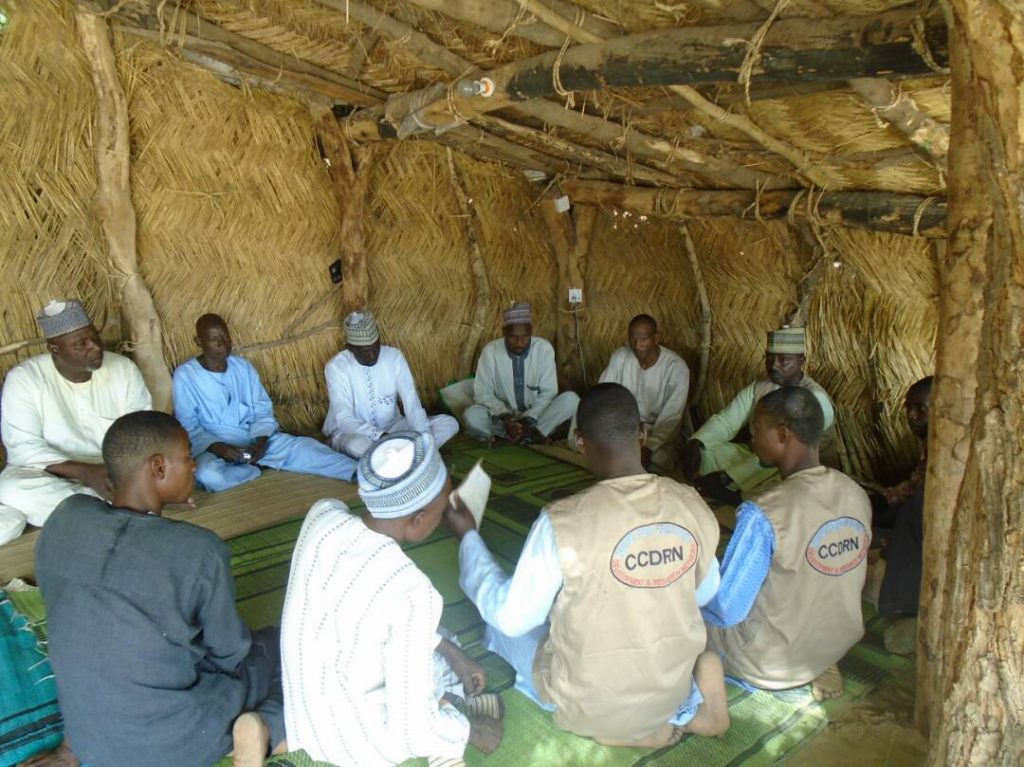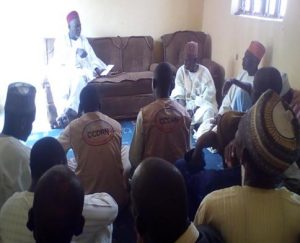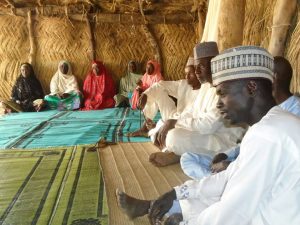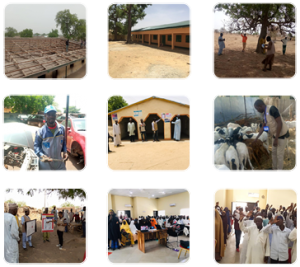Distressed by devastating Boko Haram Violence, Early Warning initiative provides pathway towards building resilience
“we have decided to remain resilient and pledge not to leave our doors open for Boko Haram to take opportunity of any misunderstanding to cause division among us and have a free zone to radicalize our people again”

CCDRN team brainstorming with community leaders during a dialogue session at Garin Gada
May 2018- Kanamma town is the birth place of the non-state armed group, the Boko Haram, and is the headquarters of Yunusari Local Government Area of Yobe State located at the border between Nigeria and the Republic of Niger at the shore of the Lake Chad Basin. Kanamma community has faced a number of terror attacks and was a fertile ground for Boko Haram recruitment and radicalization
Prior to intervention by North East Regional Initiative (NERI), in partnership with Centre for Community Development and research Network, (CCDRN) to strengthen Early Warning Mechanisms in Yunusari LGA, Kanama, the once troubled border town located some 34 kilometres away from Geidam Town also in Yobe state had lived under trepidations, mutual suspicion, allegations and counter allegations of belonging to or supporting the dreaded sect. There was no functional arrangement that represents all community groups working for identification and reporting EWS in all three communities and due to the informal nature of reporting Early Warning signs which made it an all comers job; lack of capacity by the traditional leaders and Civilian Joint Task Force to properly screen Early Warning reports and lack of effective confidentiality system that protects informants, there were many cases of internal conflict and hatred in the communities due to suspicion especially when a reported suspected person was investigated and found not related to the insurgents.
These also discourage other community members, and make them incredulous about reporting Early Warning signs or suspected insurgents activities. In most instances, the persons reported as suspected insurgents were found to be innocent and harmless. A classical example was given of a community member who was said to have been slaughtered by the suspected insurgents for allegedly disclosing information about that led to arresting one of their members in the community. This resulted in lack of trust amongst community members, who would rather look the other way for fear of being compromised.
A case was recorded in the peak of the insurgency where two members of a family openly joined Boko Haram because of the arbitrary revocation of ownership their farmland by their community leader in Kanama. Without the requisite skills, formal and well coordinated structure to deal with issues like this at community level, the two men were lost to Boko Haram. This and many other undocumented cases had been a major source of conflict giving the insurgents lots of openings to leverage on.
By 2017, the military succeeded in pushing the insurgents out of their occupied territories and enclaves in most parts of Nigeria’s northeast. Centre for Community Development and Research Network (CCDRN) with support from Northeast Regional Initiative (NERI) intervened with a project focused on strengthening the Early Warning and Response Mechanisms within GarinGada, Mozogun and Kanamma communities of Yunusari LGA in Yobe State in a bid to reinforce community-based approach to early warning and early response system. Seeing the need to be part of the process, the three focal communities welcomed and embraced the intervention whole heartedly.
“This development is indeed welcomed in our community, the reason being that just last week a youth very close to the military personnel and serves as their informant wrongly accused another youth of being a member of BH. Unfortunately, the accused was instantly arrested and killed by security operatives without proof; only for the informant to later confess that they had a personal conflict with the accused, hence the reason for the accusation. This is because the informant is not trained and a well-structured EW community mechanism to verify such claims before reporting to the security agents is absent’’ Alhaji Brem Lawan, the district head of Kanama had said in a response during an advocacy visit aimed at sensitizing communities on the importance of the project.

CCDRN team with community leaders during advocacy visit to the district head of Kanama
Following the advocacy and sensitization visit to community leaders and LGA authorities in Yunusari LGA Centre for Community Development and Research Network (CCDRN) in partnership with NERI trained carefully selected community members to form the Community Response Network (CRN) and Community Volunteers (CV) in the three communities of Kanamma, Garingada and Mozogun communities. The training was organized for stakeholders, including the fifteen selected Community volunteers comprising three males and one female to ensure inclusivity from each community and forty-five community response network members, fifteen from each community with an overall aim of promoting better understanding on Early Warning Response system for proper implementation of the project in selected communities and to improve skills, enhance attitudes and create a synergy between Community Observers and Community Response Networks s well as to make them understand their expected roles, responsibilities and improve their commitment towards the implementation and sustenance of the Early Warning Response System in their various communities.
This development has impacted tremendously on all three focal communities who are now working assiduously to firm up preventive mechanism by observing, analyzing and reporting suspicious signs that are linked to violent extremism with al alacrity. Community Response Network (CRN) whose membership was drawn from all community groups relevant in responding to EW reports such as religious leaders, traditional leaders, political leaders, youth groups, trade unions, farmers groups, women groups as well as teachers’ association are now working with the community observers to screen and analyze Early Warning information and are now engaging widely via community forum that brings all three communities together to share experience, common challenges and success stories. Collaboration between communities, local government officials and security actors to respond to early warning signs of violence is on record high.
“This intervention has done a lot for our communities as you can hear from their testimonies at the community forum meeting. Now as it is, community members have a more coordinated way of reporting early warning signs and I can tell you that I have seen a lot of achievement that has come to our community through this project and we really appreciative of this gesture. On our part as an LGA, we are working with these communities whenever they bring up anything that requires our attention. It’s just that now we still have cases of drug abuse that needs to be addressed and we are working as community to find solution to that menace. I can assure you that this intervention has brought peace to these communities and they are working hard to maintain it” said Bashir Lawal kyari, executive Vice Chairman, Yunusari LGA.
The early warning project has also helped in ensuring that parents enroll their children in schools. The constant attacks on education facilities by Boko Haram compelled parents to withdraw their children from schools but with constant sensitization and engagement by community response network as a result of the early warning program, parents are now sending their children to school. A Community Response Network member who simply identified himself s Ibrahim said this of his experience.
“Before the advent of CCDRN there was existing informal early warning system in place but it was not strong and was not properly coordinated, because, no one cared about it. One of the successes we have achieved is in the area of hard drugs abuse, the CRN responded and organized some kind of sensitization for them and we addressed it to the barest minimum secondly, children in the community were not interested in schools. We have to draw the attention of the parents to the importance of education and now the children are back to school it’s just that we have challenges of seats and some education facilities that we want NERI and other stakeholders to help the community with”.
“Again there is this problem of Forceful marriage; we had to intervene between the parents of the would-be couple. The couples like themselves but both parents were at arm’s length. However, now that we intervened and sensitized them, the wedding is now set to hold. Another important success we achieved is with a case around land dispute between family members. The district head who is a CRN member intervened and even pledged his own plot to the other party to ensure peace in the community. We really want progress in our community and that is why we have decided to remain resilient and pledge not to leave our doors open for Boko Haram to take opportunity of any misunderstanding to cause division among us and have a free zone to radicalize our people again” , he said
Goni Dalla from Kanama community also shared his experience as to how the intervention by NERI has helped unite a once troubled and broken community where insurgents cashed in on their division and lack of collaboration to terrorize and radicalize young people.
“Honestly we remain grateful to you people for bringing us together to reason as one. We are progressing and we are collaborating with security agencies to provide them information about any suspicious activity. Those that are glaring that can be handled by us remotely in the community we make all efforts to tackle them but the once that are beyond us we draw the attention of security agencies. We are interested in peace and we intend to continue with this effort even beyond the life span of this project because we don’t want another repeat of Boko Haram occupation. Following this intervention, we have now realized that we did not do enough in the past and the problem of Boko Haram came and consumed all of us. Now we know better and we will strive to ensure that there is no room for them to come to our midst again by reporting any suspicious individual or groups we suspect with violent tendencies” Dalla said.

Community leaders sitting at Village head’s palace in Garin Gada during advocacy visit by CCDRN
From the security perspective, there is a corroborative substantiation that indeed, collaboration between the focal communities, state actors and security operatives have improved. Usman Mohammmed a DSS operative in Yunusari LGA, attested to and confirmed the effort of communities in providing actionable intelligence that has helped in checking insurgents activities in the area.
“As security, our sole responsibility is to generate intelligence and the way we do so is through the grass root. Let me cite an example to you as to how this initiative has helped. For instance when you bring a security personal from kaduna, he has to depend on the locals who know the area and the people. Nothing can be achieved without the cooperation of community in the fight against extremism because these extremist live among them and they know them. I can assure you that this community has been very supportive and I believe that it is this initiative that has deepened the process. We cannot generate intelligence without the people directly affected. So, this is really helping and that is why you can see that we deemed it fit to attend this meeting. This intervention on early warning has improved collaboration and synergy. One area I think they need to do more is in the area of drugs abuse”. He said.
However, one aspect of the project that worries some community members and needs improvement and urgent attention is early response which needs to be strengthened in synergy with security agencies.
“I can assure you that this intervention has really helped to build resilience among us but we have a problem with early response. Sometimes, when we report any incidence to security agencies, they don’t respond promptly. Lack of quick response is a major problem. Some times before security agencies come in to check, such individuals suspected may have vanished into thin air and when next we report we really don’t get far reaching response because security agents usually see it as a waste of time”, Mai Kaka from Garin Gada lamented
The intervention has helped in getting communities to own the process of ensuring peaceful coexistence, blocking radicalization process and has built their resilience against violent extremism. There is now an advocacy for expansion of the project beyond the three focal communities in Yunusari LGA
